 April 9, 2020 John E. Ross, KD8IDJ, Editor
| ||||||
World Amateur Radio Day on April 18 Celebrates 95th Anniversary of the IARU Saturday, April 18, is World Amateur Radio Day (WARD), this year marking the 95th anniversary of the International Amateur Radio Union (IARU). Around the world, amateur radio special event stations -- most sponsored by IARU member-societies -- will mark the event on the air, starting on April 18 at 0000 UTC and continuing until April 19 at 0000, honing skills and capabilities while enjoying global friendship with other amateurs worldwide. The theme for WARD is "Celebrating "A few short weeks ago, many of us could not imagine the levels of isolation that we are now dealing with and the sacrifices of many on the front lines of the pandemic," Ellam said. "As we have done in past challenges to our society, amateur radio will play a key part in keeping people connected and assisting those who need support." Ellam said he's coming off his own 14-day isolation after returning from overseas. "I am touched by the kindness of strangers who assisted me when I was unable to leave my house," he said. "It strikes me amateur radio operators, who give so much during these times of crisis are not limited to assisting over the air. Amateurs are true volunteers, and I would encourage everyone to assist in the community as they are able to." On April 18, 1925, the IARU was formed in Paris, with ARRL cofounder Hiram Percy Maxim, 1AW, in attendance. Radio amateurs were the first to discover that shortwave spectrum could support worldwide propagation, and in the rush to use these shorter wavelengths, amateur radio found itself "in grave danger of being pushed aside," as IARU history puts it. Two years later, at the International Radiotelegraph Conference, amateur radio gained allocations still recognized todayâ--â160, 80, 40, 20, and 10 meters. From an initial 25 countries, the IARU has grown to include 160 member-societies in three regions. How to Participate
World Amateur Radio Day is not a contest but an opportunity to talk about the value of amateur radio to the public and our fellow amateurs. It is also a great opportunity to talk about your club and amateur radio in local media. In this time of social isolation, amateur radio continues to remain relevant in bringing people together through radio while providing essential communication in the service of communities. "My wish for this World Amateur Radio Day is for everyone to stay safe, follow the advice of medical professionals, and use amateur radio and your skills to help us through this crisis," Ellam said. COVID-19 Guidelines Could Affect Some IARU HF World Championship Participation The IARU HF World Championship is just over 2 months away -- July 11 - 12. The International Amateur Radio Union (IARU) says that it's essential to take the global COVID-19 pandemic into account when planning participation, including by IARU member-society Headquarters (HQ) station teams. Multioperator and IARU member-society HQ station operations must adhere strictly to the regulations and physical-distancing guidelines issued by the responsible health authorities and the World Health Organization in effect at the time "This may reduce participation, but it is vital that the IARU, its member-societies, and individual radio amateurs behave as responsible members of the global community," the IARU said. "Radio amateurs should always look for opportunities to address communications challenges through the application of technology." The IARU points out that a growing number of stations, including multioperator stations, can be operated remotely, and it encourages their participation in the HF World Championship wherever national regulations permit. The objective of the IARU HF World Championship is "to support amateur self-training in radiocommunications including improving amateur operating skills, conducting technical investigations, and intercommunicating with other amateurs around the world, especially IARU member-society headquarters stations." The event takes place on 160, 80, 40, 20, 15, and 10 meters. The special rules governing IARU member-society HQ stations allow multiple sites to be used, again subject to national regulations. HQ stations will still be able to participate, but possibly not at their usual level. Plans are being developed for IARU Headquarters station NU1AW to be operated entirely remotely. W1AW will also be on the air as an HQ station, although arrangements are still being finalized. Hamvention QSO Party Set for Saturday, May 16 The Hamvention QSO Party, a sort of virtual Dayton Hamvention®, will take place on the HF bands on May 16, which would be the Saturday of the now-canceled event. "Let's celebrate the many years we have all had at the Great Gathering we call Hamvention," said an announcement over the signatures of Tim Duffy, K3LR, and Michael Kalter, W8CI. "We also want to The Hamvention QSO Party will be a 12-hour event, from 1200 UTC until 2400 UTC on May 16. Operate CW or SSB on 160, 80, 40, 20, 15, and 10 meters, exchanging signal reports and the first year you attended Hamvention. If you have never attended Hamvention, send "2020." Designated members of Hamvention's host, the Dayton Amateur Radio Association (DARA), will activate DARA's W8BI. Participants can add 10 points for each band/mode contact with W8BI (12 available). Post scores (number of contacts) to 3830scores.com within 5 days of the event. An online certificate will be available to print. No logs will be collected. N1MM Logger+ has provided a user-defined contest module for the event. More information is on the N1MM Logger+ website. ARRL Podcasts Schedule
The On the Air and Eclectic Tech podcasts are sponsored by Icom. Both podcasts are available on iTunes (iOS) and Stitcher (Android) as well as on Blubrry -- On the Air | Eclectic Tech. New TQSL Version 2.5.2 Provides Better LoTW Rover Support, Other Improvements The latest version of TrustedQSL (TQSL), version 2.5.2, offers improved Logbook of The World (LoTW) support for operations from several locations, as well as the ability to detect uploads that contain incorrect location data. The primary new feature in TQSL 2.5.2 allows logging programs, in conjunction with TQSL, to avoid incorrect contact uploads, while adding mechanisms to allow easy uploading of logs for roving stations. LoTW had required rovers to identify each location When a log is signed by TQSL, the station details -- call sign, DXCC entity, grid square, and other location details provided by the selected station location (and call sign certificate) -- are compared with the details in the log. If the US state and station location in a log do not agree, TQSL 2.5.2 will reject the contact, detecting errors in instances when an incorrect station location has been chosen. This feature will necessitate changes in many logging programs, because it requires that the log provide station details previously not used by TQSL. Once a logging program supplies these (MY_STATE, MY_DXCC, MY_CQ_ZONE, etc.), then TQSL will validate them against the log. Currently, Cabrillo logs use the CALLSIGN field to verify that the contacts are for the correct call sign. Optionally, a station performing roaming operations (e.g., from multiple grid squares) can choose to have TQSL assume that the log is correct. When call sign or home station are provided with the log, TQSL will automatically update the details on the upload. Select "Override Station Location with QTH Details from your Log" on the "Log Handling" preference page to enable this feature. This release also includes an update to the most recent TQSL configuration file. -- Thanks to Rick Murphy, K1MU Circuit Board for Bare-Bones Ventilator Moves Toward Production with Radio Amateurs' Help Radio amateurs continue to play key roles in developing the electronic control system for an open-source/architecture, modular, low-cost human patient ventilator. The device itself was designed by researcher Sem Lampotang and his team at University of Florida Health -- the school's academic health center -- using such commonly available components as PVC pipe and lawn-sprinkler valves. The idea is to "The way I looked at it is, if you're going to run out of ventilators, then we're not even trying to reproduce the sophisticated ventilators out there," Lampotang said. "If we run out, you have to decide who gets one and who doesn't. How do you decide that? The power of our approach is that every well-intentioned volunteer who has access to Home Depot, Ace, Lowe's, or their equivalent worldwide can build one." His team is working on adding safety features to meet regulatory guidelines, then they will run engineering tests to determine safety, accuracy, and endurance of the machine, which can be built for as little as $125 to $250. Dr. Gordon Gibby, KX4Z -- a retired associate professor of anesthesiology at the University of Florida and an electrical engineer -- is among those involved in the project, developing control-system prototypes. He reports that a trial printed circuit board is being created, populated, and tested prior to large-scale fabrication. "This should lead to a documented open-source design that can be replicated or
improved upon by any interested manufacturer," Gibby said, noting that the board could be built anywhere in the world, based on the Arduino Nano microcontroller. "A huge amount of work has gone on in the design of the circuit boards," Gibby told ARRL. "We have at least two, maybe three designs, ready for fabrication." Current design specifications and a video of prototypes have been posted online. The Arduino-based control software will set the respiratory rate and other key parameters in treating critically ill coronavirus victims. Other radio amateurs involved in the control system aspect of the project include Jack Purdum, W8TEE, and uBITX transceiver maker Ashhar Farhan, VU2ESE. Using a Groups.io forum, up to 140 volunteers have been studying or working to push the project to completion. Software is being created by multiple volunteers, with amateur radio operators involved in that phase as well. The ventilator's valves will precisely time the flow of compressed oxygen into a patient with lungs weakened by viral pneumonia in order to extend life and allow time for the body to clear the infection. Read more. The K7RA Solar Update Tad Cook, K7RA, Seattle, reports: After 5 days of new Solar Cycle 25 sunspot activity, sunspots vanished. The average daily sunspot number rose from 3.6 last week to 5.1 this time. The average daily sunspot number over the days sunspots were visible -- March 31 - April 4 -- was 12.2, but these observations straddle two reporting weeks.
Predicted solar flux for the next 45 days is 70 on April 9 - 13; 68 on April 14 - 23; 70 on April 24 - May 7; 68 on May 8 - 20, and 70 on May 21 - 23. Predicted planetary A index is 5, 8, and 8 on April 9 - 11; 5 on April 12 - 14; 10 on April 15; 8 on April 16 - 19; 5 on April 20 - 25; 10 on April 26 - 27; 5 on April 28 - May 6; 8 on May 7-8; 5 on May 9 - 11; 10 on May 12; 8 on May 13 - 16; 5 on May 17 - 22, and 10 on May 23. Sunspot numbers for April 2 - 8 were 12, 13, 11, 0, 0, 0, and 0, with a mean of 5.1. The 10.7-centimeter flux was 69.8, 69.9, 70.1, 71.2, 69.9, 69.9, and 70.4, with a mean of 70.2. Estimated planetary A indices were 7, 9, 5, 5, 3, 4, and 13, with a mean of 6.6. Middle latitude A index was 7, 7, 4, 4, 2, 3, and 10, with a mean of 5.3. A comprehensive K7RA Solar Update is posted Fridays on the ARRL website. For more information concerning radio propagation, visit the ARRL Technical Information Service, read "What the Numbers Mean...," and check out K9LA's Propagation Page. A propagation bulletin archive is available. Monthly charts offer propagation projections between the US and a dozen DX locations. Share your reports and observations. Just Ahead in Radiosport
See the ARRL Contest Calendar for more information. For in-depth reporting on amateur radio contesting, subscribe to The ARRL Contest Update via your ARRL member profile email preferences. Several Countries Authorize COVID-19 Advisory Suffixes A growing number of countries have authorized selected radio amateurs or organizations to identify with suffixes that propagate the advice to stay at home during the COVID-19 pandemic. A60STAYHOME/# call signs are on the air from the United Arab Emirates, while the Kuwait Amateur Radio Society's 9K9STAYHOME; TC1STAYHOME, in Turkey, and the Saudi Amateur Radio Society's HZ1STAYHOME are among these stations spreading the word from that part of the world. In Canada, Michael Shamash, VE2MXU, is using VC2STAYHOM "to raise awareness for social distancing during the COVID-19 pandemic." Canada limits call sign suffixes to seven characters. On the air from Indonesia is 8A1HOME; Indonesia limits suffixes to four characters. SRAL, Finland's IARU member-society, is sponsoring the Global Amateur Radio Network special event, with "messenger stations" on the air with STAYHOME suffixes, such as OH5STAYHOME. The event runs through July 8. The Global Messenger Award and the Stay Home Award are available, with credit for working "STAY HOME" stations in other countries and at least five of the Finnish stations. Also in Finland, the Amateur Radio Club of Lahti, OH3AC, has been authorized to use OH0PYSYKOTONA and nine others in that series with a different number in the prefix. "Pysy kotona" is Finnish for "stay home." Contacts will be confirmed via LoTW with paper cards via OH3AC. An award is available for working all 10 in the series. CR2STAYHOME will be on the air from Sao Miguel, one of the nine islands in the Azores, while operators in Bosnia and Herzegovina will transmit the alert as E7STAYHOME (QSL via E77E and E73Y or LoTW). R3STAYHOME is another special call sign (QSL via the bureau to R3KEE). Also, listen for 5B4STAYHOME from Cyprus, operated by Norman Banks, 5B4AIE (no QSLs). Finland's SRAL has suggested the new Q signal QSH for "stay happy and healthy," while N3ADF is encouraging the use of QWH for "wash hands." FCC Part 97 Amateur Radio Service rules do not provide for amateur call sign suffixes longer than three characters, but a potential workaround exists. As §97.119(c) of the FCC's Amateur Radio Service rules states: "One or more indicators may be included with the call sign. Each indicator must be separated from the call sign by the slant mark (/) or by any suitable word that denotes the slant mark. If an indicator is self-assigned, it must be included before, after, or both before and after, the call sign. No self-assigned indicator may conflict with any other indicator specified by the FCC Rules or with any prefix assigned to another country." While ARRL has no plans to sponsor or support a stay home related event, US radio amateurs may do so as a one-off stay-at-home event. In Brief...
Upcoming ARRL Section, State, and Division Conventions Note: Many conventions and hamfests have been canceled or postponed due to the coronavirus pandemic. Check the calendar of canceled events on the ARRL website.
Find conventions and hamfests in your area.
. .
Subscribe to...
Free of charge to ARRL members...
| ||||||
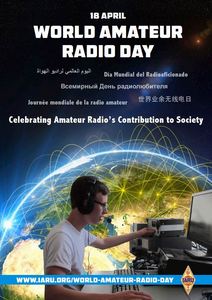 Amateur Radio's Contribution to Society." IARU President Tim Ellam, VE6SH/G4HUA, notes that the COVID-19 pandemic casts the event in a different light than in years past.
Amateur Radio's Contribution to Society." IARU President Tim Ellam, VE6SH/G4HUA, notes that the COVID-19 pandemic casts the event in a different light than in years past.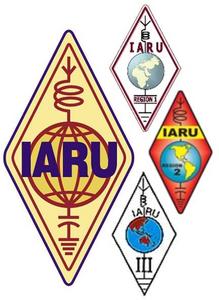 of the event -- even if observing those guidelines is not legally required at their locations. This requirement also applies to single-operator stations, and especially to those hosting guest operators.
of the event -- even if observing those guidelines is not legally required at their locations. This requirement also applies to single-operator stations, and especially to those hosting guest operators.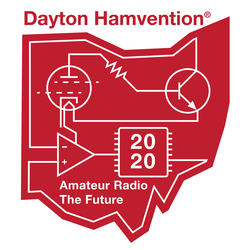 remember Ron Moorefield, W8ILC, who never missed a Hamvention and contributed to our club until his recent death. Let's light up the airwaves with our remembrances of Hamventions of the past! See you on the air!"
remember Ron Moorefield, W8ILC, who never missed a Hamvention and contributed to our club until his recent death. Let's light up the airwaves with our remembrances of Hamventions of the past! See you on the air!"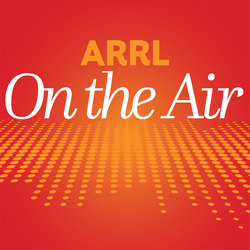 The latest episode of the On the Air podcast (Episode 4) focuses how to create a family emergency communications plan and includes an interview with Dino Papas, KL0S, about attaching coaxial connectors with crimping tools.
The latest episode of the On the Air podcast (Episode 4) focuses how to create a family emergency communications plan and includes an interview with Dino Papas, KL0S, about attaching coaxial connectors with crimping tools. The latest episode of the Eclectic Tech podcast (Episode 5) includes an interview with ARRL Laboratory Manager Ed Hare, W1RFI, about wireless power transfer technology, as well as a discussion of digital meteor scatter and an interview with Michael Lavelle, K6ML, about the new distance record at 122 GHz.
The latest episode of the Eclectic Tech podcast (Episode 5) includes an interview with ARRL Laboratory Manager Ed Hare, W1RFI, about wireless power transfer technology, as well as a discussion of digital meteor scatter and an interview with Michael Lavelle, K6ML, about the new distance record at 122 GHz.
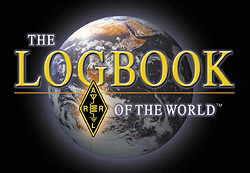 used as a separate location in TQSL. The new version of TQSL allows these operations to be handled much more smoothly by using information from the station's logging program.
used as a separate location in TQSL. The new version of TQSL allows these operations to be handled much more smoothly by using information from the station's logging program.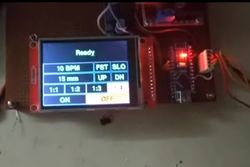 create a bare-bones ventilator that could serve in the event of a ventilator shortage.
create a bare-bones ventilator that could serve in the event of a ventilator shortage.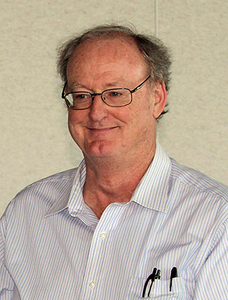
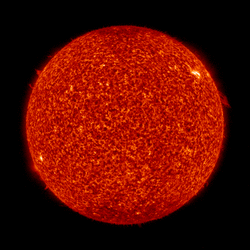 Average daily solar flux rose from 69.4 to 70.2. Geomagnetic indicators remain quiet, with the average planetary A index declining from 7.7 to 6.6, and the average mid-latitude A index slipping from 5.9 to 5.3.
Average daily solar flux rose from 69.4 to 70.2. Geomagnetic indicators remain quiet, with the average planetary A index declining from 7.7 to 6.6, and the average mid-latitude A index slipping from 5.9 to 5.3.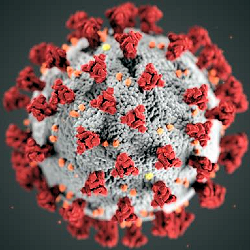 Australia has permitted the Radio Amateur Society of Australia (
Australia has permitted the Radio Amateur Society of Australia (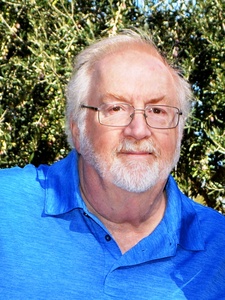 ARRL President Rick Roderick, K5UR, has appointed Edward J. "Ned" Stearns, AA7A, of Scottsdale, Arizona, as ARRL Southwestern Division Vice Director. He succeeds Mark Weiss, K6FG, who resigned. This will mark the third time Stearns has held the post. He served as Southwestern Division Vice Director for 2005 - 2006 and again for 2017 - 2019. A retired electrical engineer, Stearns has been licensed since 1963 and is active on all bands from 160 meters through 23 centimeters. His principal interests are DXing, contesting, VHF, moonbounce, antenna design, and homebrewing.
ARRL President Rick Roderick, K5UR, has appointed Edward J. "Ned" Stearns, AA7A, of Scottsdale, Arizona, as ARRL Southwestern Division Vice Director. He succeeds Mark Weiss, K6FG, who resigned. This will mark the third time Stearns has held the post. He served as Southwestern Division Vice Director for 2005 - 2006 and again for 2017 - 2019. A retired electrical engineer, Stearns has been licensed since 1963 and is active on all bands from 160 meters through 23 centimeters. His principal interests are DXing, contesting, VHF, moonbounce, antenna design, and homebrewing. The annual Armed Forces Day Crossband Test has been postponed, due to the ongoing COVID-19 response and mitigation actions. The 2020 Armed Forces Day (AFD) Crossband Test was scheduled to be held on Saturday, May 9. Because it's uncertain just when stay-at-home orders will be lifted across the US, AFD planners chose to postpone this year's event, because the government stations that typically support this event may not be available. Armed Forces Day Crossband Test planners are considering scheduling a November event in honor of Veteran's Day, depending on COVID-19 mitigation actions. During the AFD Crossband Test, military stations in various locations transmit on selected military frequencies and announce the specific ham frequencies they are monitoring to work radio amateurs. -- Thanks to US Army MARS Program Chief Paul English, WD8DBY
The annual Armed Forces Day Crossband Test has been postponed, due to the ongoing COVID-19 response and mitigation actions. The 2020 Armed Forces Day (AFD) Crossband Test was scheduled to be held on Saturday, May 9. Because it's uncertain just when stay-at-home orders will be lifted across the US, AFD planners chose to postpone this year's event, because the government stations that typically support this event may not be available. Armed Forces Day Crossband Test planners are considering scheduling a November event in honor of Veteran's Day, depending on COVID-19 mitigation actions. During the AFD Crossband Test, military stations in various locations transmit on selected military frequencies and announce the specific ham frequencies they are monitoring to work radio amateurs. -- Thanks to US Army MARS Program Chief Paul English, WD8DBY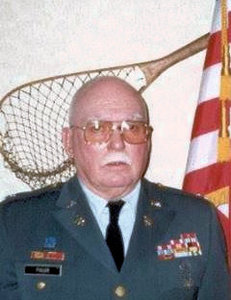 Past ARRL Atlantic Division Director Bernard E. "Bernie" Fuller, N3EFN, of Saegertown, Pennsylvania, died on April 2. He was 86. Fuller moved into the Atlantic Division Director's position in 2000, after the ARRL Board elected then-Atlantic Division Director Kay Craigie, WT3P (now N3KN), as a Vice President. He served as an ARRL Director until 2006. A US Army veteran, Fuller retired with the rank of Lieutenant Colonel after 22 years. He was a veteran of the Korean and Vietnam wars. Following his retirement, he taught languages at the former Alliance College. Fuller was a member of the QRP Amateur Radio Club International and the Eastern Pennsylvania QRP Club. He belonged to the Military Officers Association and was a certified National Rifle Association instructor. A member of the Pennsylvania Outdoor Writers Association, Fuller authored e-books on RVing and hunting and was the publisher of the Outdoors32News newsletter.
Past ARRL Atlantic Division Director Bernard E. "Bernie" Fuller, N3EFN, of Saegertown, Pennsylvania, died on April 2. He was 86. Fuller moved into the Atlantic Division Director's position in 2000, after the ARRL Board elected then-Atlantic Division Director Kay Craigie, WT3P (now N3KN), as a Vice President. He served as an ARRL Director until 2006. A US Army veteran, Fuller retired with the rank of Lieutenant Colonel after 22 years. He was a veteran of the Korean and Vietnam wars. Following his retirement, he taught languages at the former Alliance College. Fuller was a member of the QRP Amateur Radio Club International and the Eastern Pennsylvania QRP Club. He belonged to the Military Officers Association and was a certified National Rifle Association instructor. A member of the Pennsylvania Outdoor Writers Association, Fuller authored e-books on RVing and hunting and was the publisher of the Outdoors32News newsletter.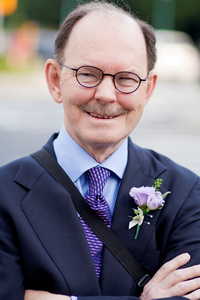 Past ARRL Treasurer James E. "Jim" McCobb, Jr., K1LU (ex-K1LLU, W1LLU), died on April 1. An ARRL Life Member, he was 77. McCobb, of West Newbury, Massachusetts, served as ARRL Treasurer, a volunteer post, for nearly 32 years, from 1980 until 2012, when he was succeeded by current ARRL Treasurer Rick Niswander, K7GM. An active DXer and contester, McCobb was active from Belize, where he held the call sign V31JR. McCobb was a US Air Force veteran and spent most of his professional career as a banker. First licensed at age 16, McCobb was very active on HF -- especially on 40, 20, and 17 meters, primarily on SSB, although he operated CW during contests. He also enjoyed listening to amateur and shortwave bands, DXing, ragchewing, contesting, and "doing just about any kind of antenna work," he said in his QRZ.com profile. His other hobbies included Alpine skiing, listening to music, and collecting stereo equipment from the mid-to-late 1970s.
Past ARRL Treasurer James E. "Jim" McCobb, Jr., K1LU (ex-K1LLU, W1LLU), died on April 1. An ARRL Life Member, he was 77. McCobb, of West Newbury, Massachusetts, served as ARRL Treasurer, a volunteer post, for nearly 32 years, from 1980 until 2012, when he was succeeded by current ARRL Treasurer Rick Niswander, K7GM. An active DXer and contester, McCobb was active from Belize, where he held the call sign V31JR. McCobb was a US Air Force veteran and spent most of his professional career as a banker. First licensed at age 16, McCobb was very active on HF -- especially on 40, 20, and 17 meters, primarily on SSB, although he operated CW during contests. He also enjoyed listening to amateur and shortwave bands, DXing, ragchewing, contesting, and "doing just about any kind of antenna work," he said in his QRZ.com profile. His other hobbies included Alpine skiing, listening to music, and collecting stereo equipment from the mid-to-late 1970s..jpg) Japan is set to expand access to 160 meters. Yoshi Shoji, JG7AMD, reports that Japan's Ministry of Internal Affairs and Communications that the expansion will permit SSB on that band. The current 160-meter band in Japan consists of 1810 - 1825 kHz (CW) plus 1907.5 - 1912.5 for CW and data. Japan will allocate 1800 - 1810 kHz and 1825 - 1875 kHz for all amateur radio modes. An effective date has not yet been announced.
Japan is set to expand access to 160 meters. Yoshi Shoji, JG7AMD, reports that Japan's Ministry of Internal Affairs and Communications that the expansion will permit SSB on that band. The current 160-meter band in Japan consists of 1810 - 1825 kHz (CW) plus 1907.5 - 1912.5 for CW and data. Japan will allocate 1800 - 1810 kHz and 1825 - 1875 kHz for all amateur radio modes. An effective date has not yet been announced.







